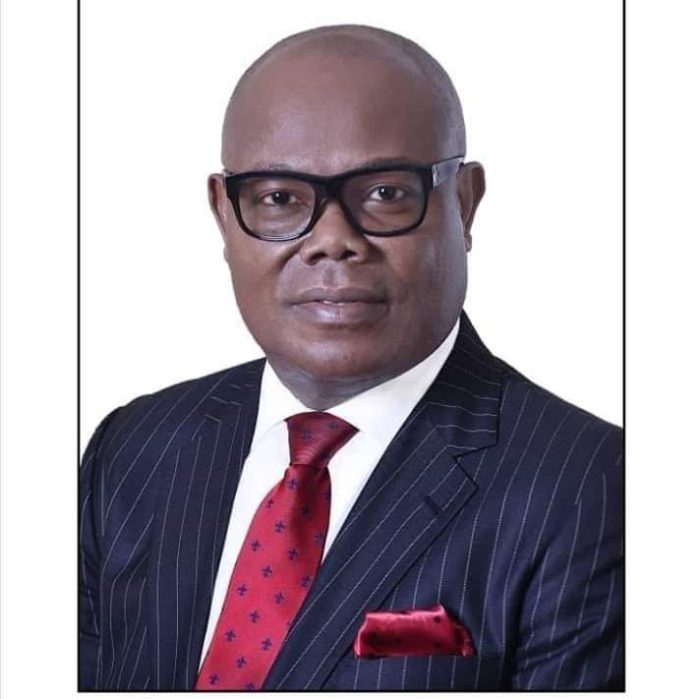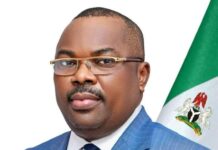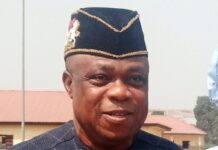Mr. Akan Okon, Honourable Commissioner for Economic Development and Ibom Deep Seaport.
Recently, the Akwa Ibom state government led by Governor Udom Emmanuel, mandated the state Ministry of Economic Development and Ibom Deep Seaport, to develop a – 30 year development plan for the state. At the state’s executive council meeting held few weeks ago, the Commissioner for Economic Development and Ibom Deep Seaport, Mr. Akan Okon, presented highlights of the plan. Okon shared highlights of the 30 years proposed development plan an interview with journalists. Abasifreke Effiong was there for The Dune
Q: Tell us about the proposed development plan which the Governor, Mr. Udom Emmanuel, recently mandated the Ministry of Economic Development to draw up for the state?
A: During the last state executive council, the Ministry of Economic Development made a presentation to the exco on the need for the state to have a 30 year development plan. You know that there is no country or society that has succeeded without a plan. A long term development plan for the state entails agreeing on where the state wants to be, taking into consideration the various sectors.
The eight points completion agenda of Governor Udom Emmanuel are the foundations and pillars which the development plan would be built on. You know that if you have a plan, you will have development in a very seamless and structured manner such that the society stands to gain from it. We understand that for the plan to be successful, there must be a buy – in by the people of the state and the leaders. Having a development plan is most necessary because it is important we know where we are going to and focus our attention on doing the things that will take us to our desired development point.
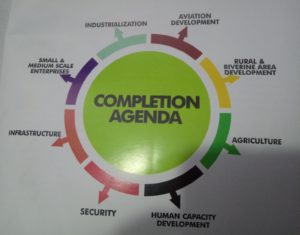 Infographic of Governor Udom Emmanuel completion agenda (2019 – 2023).
Infographic of Governor Udom Emmanuel completion agenda (2019 – 2023).
Note that since the creation of the state we have not had a long-term development plan. What we have been working on has always been annual budget. We believe that it is time for Akwa Ibom state to begin to plan ahead and run her affairs bearing in mind that one day we should run an economy without having to depend on oil. Today, we are witnesses to what is happening in the world, crude oil price has dipped by over 50 percent. As I speak to you, dependency is on FAAC (Federal Account and Allocation Committee) for funding of projects and other activities. However, I want to commend His Excellency, Governor Udom Emmanuel, for his vision which has reduced total dependency on oil and what money comes from FAAC. You know that upon assumption of office, he has consistently encouraged agriculture. The Governor has said insistently that a population that can not feed itself cannot talk of growth or meaningful development. We have seen the buy – in and how that has made food available and affordable all – year – round.
The advantages of having the development plan are enormous. The plan will be anchored on the following pillars; industrialisation, economic growth, agriculture, social development and security, revenue generation and the rest of them. These are the pillars this plan will hinge on, which we think will help accelerate development.
Q: What are the priority areas on the proposed development plan?
A: The plan addresses the entire gamut of the economy. The plan will have industrialisation. Under it, we will not look at just building industries, we will also look at policies that will ensure optimum utilisation of our scarce resources, and the aim in mind would be to generate employment and increase the quality and number of job groups in our environment.
Another aspect of it is infrastructure development. You know that the provision of efficient and effective infrastructure for ease of movement, doing business and other engagements is important? This plan will take into consideration all the little details on that and wrap our attention around what the state will need in the years ahead as part of her infrastructure.
We have social development and security. This involves planning for the improvement in the quality of live of the people, affordable healthcare, housing, access to affordable water, promotion of gender equality, empowerment of women, improved access to credit facilities, and peaceful environment. So, all what I’m taking about now are the pillars. By the time it is drilled down, the various non – oil sectors of the economy will be looked at in details bearing in mind where we want to be at a particular point in time and the things we need to do to take us there.
READ : Akwa Ibom proposes 30 years development plan, cuts overhead, capital expenditure in 2020 budget
We also have human capacity development as one of the pillars. Under that we have poverty alleviation and sustainable environment. If you have a sustainable environment – today’s generation will be able to meet its own needs without compromising the ability of future generation to also meet their needs – that can only be done if you have a plan in place to guide your policies, programmes and actions.
We will have a five yearly review of the plan so that we can accommodate new interventions.
Q: Are you saying that the plan will have a five year review period?
A: Yes. Normally, when you have a plan, you must have a medium term expenditure framework that is used for the implementation of the budget. In addition to also having the opportunity to review and adjust based on prevailing socio – economic factors, you must also have a five yearly fiscal plan as supplementary to the development plan. This is necessary because it will help us align the revenues and expenditures framework for the state for that particular period taking into consideration the ways and means of funding the economic plan for the five years.
Q: You mentioned agriculture under the proposed development plan. It appears the state government does not get returns on her investments in agriculture. What would be the new approach to agriculture, such that people won’t crash into government agric programmes for the sole purpose of getting free facilities?
A: There are serious returns on the state government’s investments in agriculture. As you rightly said, there is a buy – in and as it stands now if we were fully dependent on import for the food we consume here, it would have been more challenging. Through the Dakadda philosophy, there has been a buy – in. People have gone back to farm. Currently, the tomatoes, cucumber and other vegetables that we used to buy from other states are available here. So, there is huge returns on investments on agriculture both for the government and the farmers. Look at the green house project for instance, the harvest there is very encouraging.
Note that the state government has a committee mandated to harmonize all the investments it has made in agriculture. From our statistics, it is obvious that there has been significant improvement in terms of people’s participation in agriculture and the food available for us to consume locally.
RELATED STORY : Governor Emmanuel’s dry season farming, offering witty options for more food
Q: We are almost in the month of April and farmers are yet to start planting because there is no rainfall yet. This points to one thing, that we may not have enough food in the state. What is government thinking about this?
A: We are experiencing the impact of climate change but I can tell you that government has a large, sufficient and sustainable plan for agriculture. If you look at the budget for 2020, you will see that agriculture was given prominence in terms of provisions in the budget.
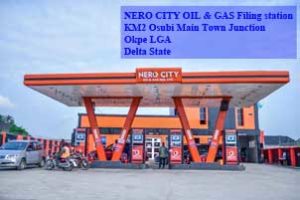 Advertisement
Advertisement
Q: It is often said that government is a continuum, but often too you see a successive administration veer off the plans laid out by the preceding administration. Don’t you think this could be a major pitfall for the proposed 30 years development plan?
A: There will be need for legislation because most societies that have developed in the way that we admire, the tenure of their leaders are not always eights years. Take for instance Singapore. Her fourth President, Wee Kim Wee, was there from 1985 to 1993, building on the development plan that was laid. That is why Singapore is where it is now.
So, what will help us is, legislation. I believe that any government that is responsible, that comes in to see that there is a direction to the development of the state and improvement in the standard of living of the people, will follow the plan. A legislation backing up the development plan will ensure that every administration abides by what has been put in place.
Q: The engine of economic growth in the state would depend on the growth of micro and small scale businesses and the non – formal sector. What is in the proposed plan for such businesses and the non – formal sector?
A: In the plan, we have economic growth. Under it, the target is to ensure that policies are put in place to encourage micro, medium and large scale enterprises to thrive. What I have told you about the proposed plan is just the pillars, when we drill down each of it, you will see each of these being highlighted because government knows as you rightly said, that the engine room of any economy is micro, small and large scale enterprises. So, enterprises and entrepreneurs would be given the space and environment to operate and do their businesses in a way that will boost the economy.
In drawing up this plan, we are looking at the available raw materials for industries in the state. This will guide us to determine the kind of industries to bring to the state. The development plan is a complete package that will take into consideration all the variables in the state and beyond. Mind you, it’s not going to be about our state alone because we will have economic linkages regionally and internationally.
Q: The state government trained some youths under the Akwa Ibom Enterprise and Employment Scheme, AKEES, and afterwards they were not properly supported to start up businesses. What would this plan mean for such young, aspiring entrepreneurs?
A: Let me repeat that this plan will cover everything. Youth employment, entrepreneurship, rural development. We will tell ourselves through the development plan what we want our rural communities to look like in the next 30 years; where we want our education system and transportation system to be in the next 30 years. We will look at all the development poles and ensure that we have a direction and a roadmap. So, rest assured that everything will be taken into consideration.
In all of this, government knows that there must be a buy – in of the leaders and citizens for the plan to be successful.
Q: When you say stakeholders and citizens will have to buy into the development plan, are we expecting the government to draw up the plan and hand it down to the people. What considerations and contributions would the governed have in this plan?
A: We will not sit down at the ministry and write the plan, everyone will be involved. The people of the state which this plan is made for will be involved so that when we are done with formulation of the plan, there will be a buy -in . That is part of the process. People will be given opportunity to make inputs.
Q: At what point will the people make input? Is it at the the formulation stage or at the stage of legislation as it is often the case in the annual budget process?
A: Things have changed. There is what we call ‘the citizens’ budget’. In the budget now, the underlying consideration is on the needs of the people. You cannot go to a community and say you want to give them road – because citizens’ budget emphasizes that you must draw your budget based on needs of the people by interacting with them. That is why we encourage ministries that are involved in one project or the other to interact with people and would be benefiting communities before they come for presentation. Most times when the Governor goes for a function, communities make requests for what they want, and that will be included in the budget.
Things are changing in the budgeting process. Now, the emphasis is that it should be bottom – up. Apart from meeting the germane needs of the people, the bottom – up approach to budgeting ensures that budget is presented in a very simple format that every person would be able to understand what is presented. So, this would be the approach and format for the development plan.
Q: Going by current economic situation, how will the state fund this plan in the short term?
A: One of the pillars of the plan will be revenue generation. And, we are looking at improving tax and non – tax sources of revenue and also raising our IGR (Internally Generated Revenue) so that our dependence will not be on federal allocation. Mind you, we are looking at industrialisation on one hand; when we provide enabling environment for industries to come in, it will kick up our revenue. All these are linked together to give us an outline of what we should expect.
Q: You talked about raising IGR. We know that the state government is having difficulties collecting taxes from some companies operating in the state. What strategy would you come up with in the plan to surmount tax default?
A: There is a mechanism that would be put in place to ensure that those that are in the tax net pay relevant taxes to the state, while ensuring that those who are not there yet are brought into the tax net. The mechanism will ensure tax compliance. As I said earlier, formulating a development plan is a process, but I can assure you that the plan will take all of these into consideration. Relevant bodies and all the people that should make inputs will make their contributions before we get we get the final plan.
READ : Mobil, GTBank owe Akwa Ibom state N24.68 billion PAYE taxes
Q: How soon will your ministry start the process of developing this plan?
A: The government has given my ministry the approval to start the plan. We are brainstorming so that no element would be left out because at the end of the day we want a development plan that is acceptable, implementable and that which will lead to the development of the state. To answer your question on how soon will we start working on the plan, I will say that it is not something that will last forever but from our interaction you can see that enormous work is involved. Nevertheless, we will finish it within given time frame.
Q: While working on the long term development plan, what is the fate of the 2020 budget and what is government’s economic plan in the interim in the face of the recent dip in the prices of crude oil?
A: The way it is now, our economic projections are not attainable. So there is need for a review. The federal government has reviewed its own budget and has gone back to the National Assembly for approval. There are certain things that we must know, that is, when your revenue drops, the first thing to do is to concentrate on survival. So, we will suspend some capital projects. We will see what needs to be done to ensure that overhead is reduced in order to operate within the resources available. We have to prioritize our activities because as I speak to you now, the number one thing is survival.
Q: Based on the revenue shortfall that is starring us in the face, when should we expect a review of the 2020 budget to show the people the new direction of government for this fiscal year?
A: We have commenced work on it. We will engage the various ministries and will come up with a position that everyone would see. Because right now, the last FAAC ended in a stalemate because there was significant reduction in the amount available. In fact, the projection is that we will lose not less than 30 percent of projected revenue; therefore, there is need for us to adjust our budget.
Note that the federal government crude oil benchmark was $53 per barrel. But as I speak, the price of crude oil has gone below $20 per barrel. We are in very difficult times because of the impact of the outbreak of Coronavirus on the world economy.



